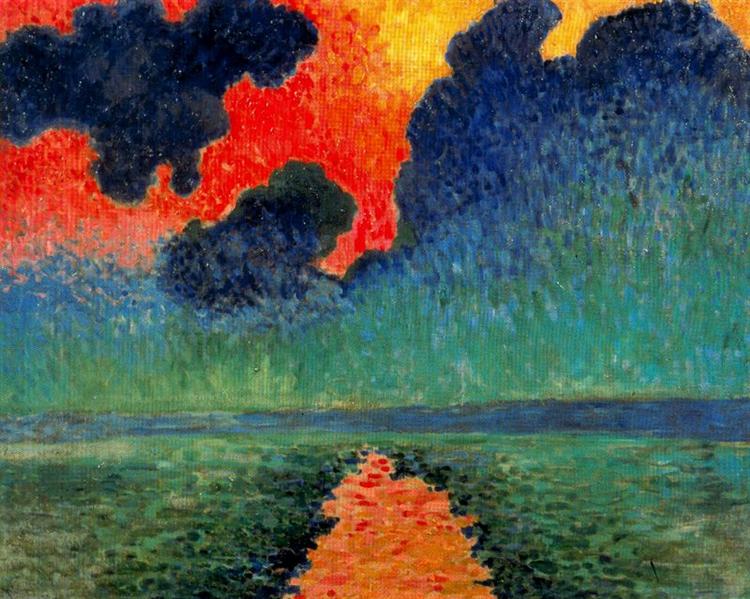FINIS (4)
By:
August 7, 2021

HiLoBooks is pleased to serialize Canadian author Frank L. Pollock’s 1906 proto-sf story “Finis” (also published as: “The Last Dawn”) for HILOBROW’s readers.
ALL INSTALLMENTS: 1 | 2 | 3 | 4 | 5.
“Hurry! This building will collapse!” Eastwood shouted.
They rushed down another flight, and heard the crash with which the monster broke over the city. A deluge of water, like the emptying of a reservoir, thundered upon the street, and the water was steaming hot as it fell.
There was a rending crash of falling walls, and in another instant the Physics Building seemed to be twisted around by a powerful hand. The walls blew out, and the whole structure sank in a chaotic mass.
But the tough steel frame was practically unwreckable, and, in fact, the upper portion was simply bent down upon the lower storeys, peeling off most of the shell of masonry and stucco.
Eastwood was stunned as he was hurled to the floor, but when he came to himself he was still upon the landing, which was tilted at an alarming angle. A tangled mass of steel rods and beams hung a yard over his head, and a huge steel girder had plunged down perpendicularly from above, smashing everything in its way.
Wreckage choked the well of the staircase, a mass of plaster, bricks, and shattered furniture surrounded him, and he could look out in almost every direction through the rent iron skeleton.
A yard away Alice was sitting up, mechanically wiping the mud and water from her face, and apparently uninjured. Tepid water was pouring through the interstices of the wreck in torrents, though it did not appear to be raining.
A steady, powerful gale had followed the whirlwind, and it brought a little coolness with it. Eastwood enquired perfunctorily of Alice if she were hurt, without being able to feel any degree of interest in the matter. His faculty of sympathy seemed paralysed.
“I don’t know. I thought — I thought that we were all dead!” the girl murmured in a sort of daze. “What was it? Is it all over?”
“I think it’s only beginning,” Eastwood answered dully.
The gale had brought up more clouds and the skies were thickly overcast, but shining white-hot. Presently the rain came down in almost scalding floods and as it fell upon the hissing streets it steamed again into the air.
In three minutes all the world was choked with hot vapour, and from the roar and splash the streets seemed to be running rivers.
The downpour seemed too violent to endure, and after an hour it did cease, while the city reeked with mist. Through the whirling fog Eastwood caught glimpses of ruined buildings, vast heaps of debris, all the wreckage of the greatest city of the twentieth century.
Then the torrents fell again, like a cataract, as if the waters of the earth were shuttlecocking between sea and heaven. With a jarring tremor of the ground a landslide went down into the Hudson.
The atmosphere was like a vapour bath, choking and sickening. The physical agony of respiration aroused Alice from a sort of stupor, and she cried out pitifully that she would die.
The strong wind drove the hot spray and steam through the shattered building till it seemed impossible that human lungs could extract life from the semi-liquid that had replaced the air, but the two lived.
After hours of this parboiling the rain slackened, and, as the clouds parted, Eastwood caught a glimpse of a familiar form halfway up the heavens. It was the sun, the old sun, looking small and watery.
But the intense heat and brightness told that the enormous body still blazed behind the clouds. The rain seemed to have ceased definitely, and the hard, shining whiteness of the sky grew rapidly hotter.
The heat of the air increased to an oven-like degree; the mists were dissipated, the clouds licked up, and the earth seemed to dry itself almost immediately. The heat from the two suns beat down simultaneously till it became a monstrous terror, unendurable.
An odour of smoke began to permeate the air; there was a dazzling shimmer over the streets, and great clouds of mist arose from the bay, but these appeared to evaporate before they could darken the sky.
The piled wreck of the building sheltered the two refugees from the direct rays of the new sun, now almost overhead, but not from the penetrating heat of the air. But the body will endure almost anything, short of tearing asunder, for a time at least; it is the finer mechanism of the nerves that suffers most.
Alice lay face down among the bricks, gasping and moaning. The blood hammered in Eastwood’s brain, and the strangest mirages flickered before his eyes.
Alternately he lapsed into heavy stupors, and awoke to the agony of the day. In his lucid moments he reflected that this could not last long, and tried to remember what degree of heat would cause death.
Within an hour after the drenching rains he was feverishly thirsty, and the skin felt as if peeling from his whole body.
RADIUM AGE PROTO-SF: “Radium Age” is Josh Glenn’s name for the nascent sf genre’s c. 1900–1935 era, a period which saw the discovery of radioactivity, i.e., the revelation that matter itself is constantly in movement — a fitting metaphor for the first decades of the 20th century, during which old scientific, religious, political, and social certainties were shattered. More info here.
SERIALIZED BY HILOBOOKS: James Parker’s Cocky the Fox | Annalee Newitz’s “The Great Oxygen Race” | Matthew Battles’s “Imago” | & many more original and reissued novels and stories.
